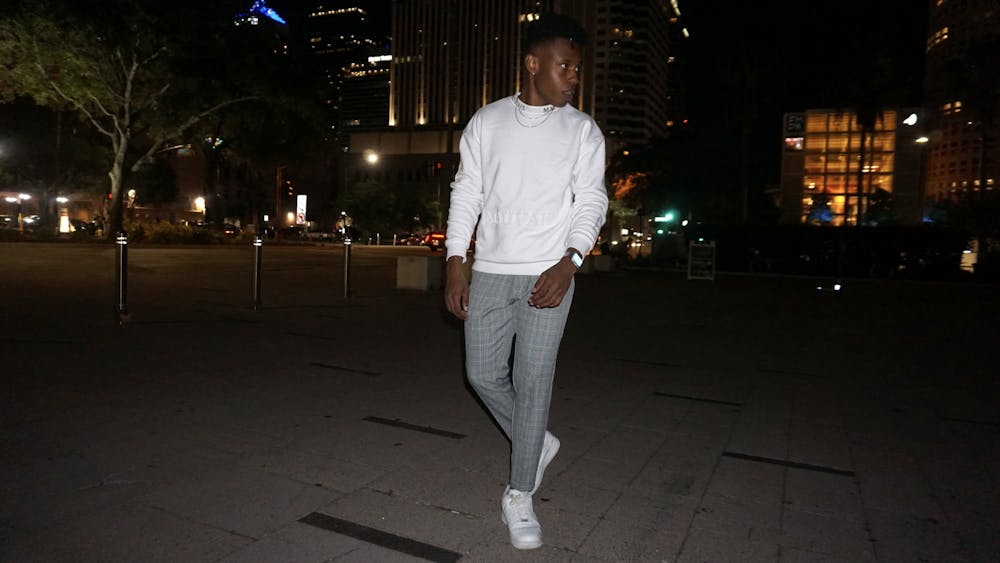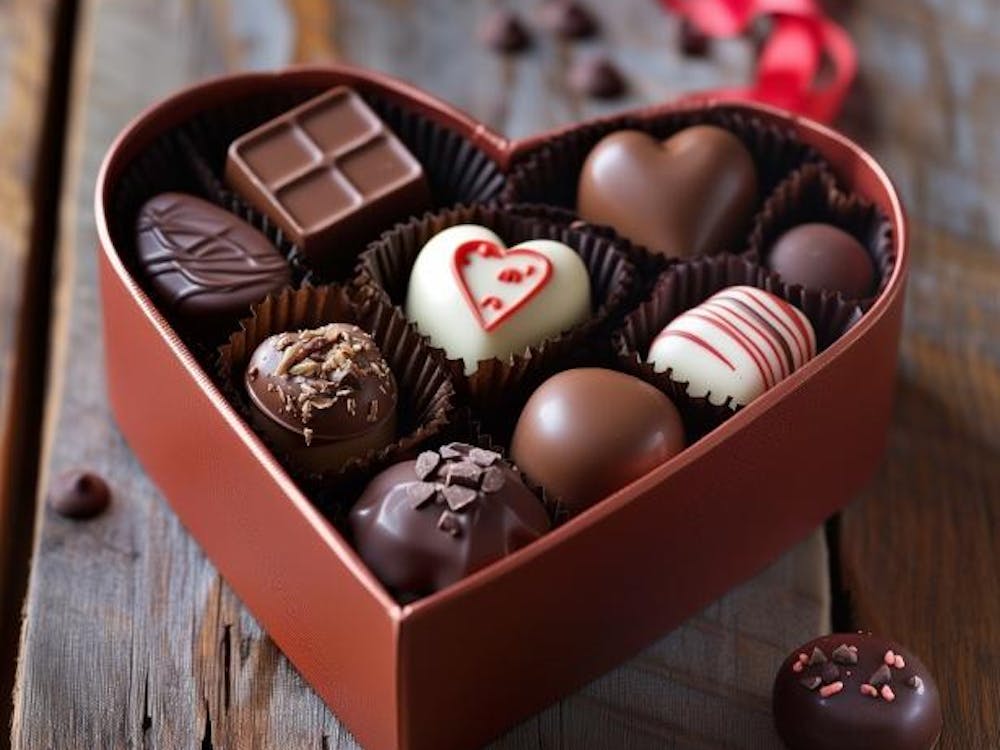Naaji Hylton ’22, known professionally as J. Paris, is the opener for Lawnparties. Hylton is a rapper influenced by hip-hop and pop from Tampa, Fla. He studies neuroscience and is an Assistant Residential College Adviser (ARCA) in Butler College. The Daily Princetonian sat down with Hylton to discuss the event and his music. The following was edited lightly for clarity and brevity.
The Daily Princetonian: You said that your influences include the Weeknd, Drake, Travis Scott, and others in hip-hop and rap — and maybe other artists as well. How have those artists influenced you and why those in particular?
Naaji Hylton: Yeah, I didn’t really start listening to too much music, I think, until like the middle of high school. Spotify came out and it was starting to get really popular and you know, yeah, the ad-supported one — you'd have to buy every song.
Drake was dominating the charts at the time. I always listen to Drake. I [have] always loved his music. It has a special place in my heart. It would always be played in one of my uncle’s cars. He took me out every Friday and I’d have to listen to that.
Then, [there was also] just, like, listening to the Weeknd as I got older. I really like his music. I like the style. Other influences [include] Travis Scott, PARTYNEXTDOOR — I’m really into production. Travis Scott has amazing production on his tracks. And so I’d always admired that, maybe not necessarily performatively, but production-wise. Take his collaborations with Mike Dean, Kanye West, for instance. I’ve always admired them from a production standpoint. They’ve been pretty big influences for me.
DP: They’re musicians as well as rappers.
NH: Yeah, exactly.
DP: So you sort of alluded to this in your answer there. But what got you into making music originally? What made you want to make your own music?

NH: My brother used to rap and stuff, and I’d see him do it. And, you know, I always looked up to my brother. He would have sessions and have me record for him or edit some of his stuff. He eventually went to the military, and I didn’t really have that sort of rap influence in my life anymore. And I didn’t really listen to much rap. So it was pop for a while. But I think hearing rap on the radio every once in a while, and really liking Drake stuff, I kind of got back into it over time. At the start of high school, you know, you’d have people at the lunch tables, and everyone [at] my lunch table would like rap, freestyle rap, and make jokes at each other and stuff. I think doing that over time grew on me. I practiced and, yeah, just fell in love with it.
DP: You hear it on the radio and think “I could do that.”
NH: Yeah, no, not at all … something like that.
DP: Similar to how you got into music — I’m curious. Your stage name, J. Paris. Where does that come from? What’s the meaning behind that?

NH: The J is from Naaji. Paris like Hilton, like Naaji Hylton. It’s just my name. It’s another way of saying it.
DP: Who are you trying to reach with your music? What are you trying to say? And who are you trying to say it to? What’s the goal when you make a song?
NH: I like making music that’s universally appealing. It can kind of talk to the soul, right? The stuff that — it doesn’t really matter who you are, where you’re from — everyone can kind of relate with. I have people reach out to me from all over the world. And it’s not necessarily that they’ve been in the same exact situations — they’re not from America, they’re not from Florida, or they’re not, you know, doing the same things that I do. But at the same time, what I’m talking about — like happiness, heartbreak, love, anguish, love, fear, anxiety — these are emotions that everyone can relate with. I’m making music about those things that connect us all as humans.
DP: Have you been able to perform for other Princeton students before in an environment like this? How is that going to feel, to be able to communicate those raw emotions to people who are going through the exact same experiences — that real empathetic experience, where you’re on stage speaking to other Princeton students, people very similar to you?
NH: Yeah, it’s gonna be definitely pretty interesting performing for my peers; I pretty much didn’t tell people I made music until this year. I told my friends, and then my friends … told their friends, and starting this year, a lot of people knew. Before, I was actively not telling people that I made music. But this year I started being more open about it, if it came up in conversation. I’m still backtracked with my last release to fully commit to other performances. With the Lawnparties thing — I figured it’d be pretty cool to do. So I was like, all right, I’ll do that.
DP: Have you ever performed in front of an audience this large?
NH: No, definitely not on this scale. I’ve had other smaller things, but this is definitely going to be the largest. This is probably my first real performance.
DP: What are your goals for your career in music? In five, 10, 20 years, what’s your best-case scenario?
NH: For the past few years, and even still a little bit now, and going into the future, I’ve just focused so much on quality — trying to make something that I feel is objectively good. That has been super important to me.
People have reached out like, “It’s cool. You make really good music now. It can be on the radio. It has been on the radio. You need to start promoting it and talking to labels.” The first few steps might be finding a good deal that works with me, my environment, my situation, and just getting it out there. The content’s there, the quality is there. I haven’t really made that push for, like, putting it out to people. It’ll get as big as it can get. It’s not like I’m necessarily searching to be the largest artist of all time, but at the same time, I know my music is really good. I know it appeals to a wide demographic and I know a lot of people really like it and that makes me really happy. So I’m just excited to see how far I can go.
DP: At the end of the day you have to be your own biggest fan.
NH: Yeah.
DP: If you could make or produce a song with anyone, who would it be?
NH: If I could make a song with anyone, it probably has to be — it has to be Drake. It has to be. I can’t say anyone else. Drake’s my biggest influence. He’s my favorite rapper.
In terms of production, Mike Dean or Kanye. I mean, it’d be crazy to like, you know, work on something produced by Kanye, or co-produced by Mike and Kanye. They have amazing stuff. If you listen to “Donda,” you listen to “The Life of Pablo” — it’s amazing, the production quality. You can tell Mike was working his butt off.
DP: What do you want the audience to be feeling when they leave your show?
NH: I definitely want to give an amazing show. I would really love if when I finished my set, people thought, “Wow, that was fucking amazing.” If that was their core response then I’d be pretty happy. I want to create art. In shows it’s about getting people really hype and bringing the energy there but at the same time, I still love the artistic environment I like to create in my music. So if I could do a combination of that and have them leave thinking, “Wow, this was extremely entertaining. It got me super hype, super excited, but also that was an artistic environment that I was allowed to experience.” That’d be amazing for me.
DP: Anything else you’d like to add?
NH: I’m just excited to perform for everyone. I’m excited to give a good show. I think it’ll be pretty good. And I’m practicing to make sure I can have some good content out for you guys.
Gabriel Robare is a Senior Writer for The Prospect, co-Head Editor of the Puzzles section, and a Contributing News Writer at the 'Prince,' who often covers literature and the self. He can be reached at grobare@princeton.edu, and on Instagram and Twitter at @gabrielrobare. He previously served as an Associate Sports Editor.








